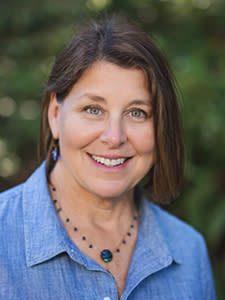New Oregon fish and wildlife director, an agency insider, is first woman at the helm

Spring Chinook salmon in the Rogue River watershed are protected by the Oregon Department of Fish and Wildlife. Debbie Colbert, the new leader of the agency, will need to continue to find revenue to fund conservation and balance the interests of anglers and conservationists. (Oregon Department of Fish and Wildlife)
About 50 years after the Oregon Department of Fish and Wildlife hired its first female field biologist, it will be led by one.
The Oregon Fish and Wildlife Commission has appointed Debbie Colbert, a biologist, oceanographer and the current deputy director of the agency, to its top leadership position following the April retirement of former director Curt Melcher, who spent a decade at the helm. The six members of the commission, including four women, voted unanimously to appoint Colbert over Kaitlin Lovell, fish and wildlife manager of Portland’s Bureau of Environmental Services.

Colbert, 54, who’s worked for nearly eight years at the agency, including as deputy director for administration, will likely start as director on Monday and earn up to $240,000 a year.
“The number of women in leadership positions at ODFW is growing,” Michelle Denehy, an agency spokesperson, said in an email. “Former Director Curt Melcher was noted for bringing more women into leadership positions in the agency, particularly in the director’s office.” Today, women also make up a growing number of Oregon hunting and fishing licenses holders – about 20% – according to state data.
Wildlife conservationists expressed cautious optimism about Colbert’s hiring. Bethany Cotton, conservation director of the Eugene-based nonprofit Cascadia Wildlands, said she was pleased to have a woman at the helm of the agency and that she hopes Colbert will focus on protecting and improving the health of wildlife and habitat in Oregon for non-consumptive purposes.
“It will be very important to diversify the funding stream for the agency,” Cotton said.
Colbert will oversee more than 1,200 employees across the state and a two-year budget of $555 million, about half of which comes from the sale of hunting and fishing licenses and federal taxes on hunting and fishing equipment.
In her interviews with the commission on Friday, Colbert said she’d continue to find sustainable funding for the agency and move away from an overreliance on hunting and fishing fees and taxes. When Melcher took over the department nearly a decade ago, it was in the midst of a budget crisis. For years, it had relied too heavily on declining sales of hunting and fishing licenses for revenue, leading to a $32 million budget gap. As deputy director, Colbert helped close that gap.
Conservationists hopeful
Both Colbert and Lovell were recruited via Tigard-based Motus, a staffing agency hired by the commission, in a process that some conservationists called rushed.
In the end, however, many said they approved of Colbert and hope that she’ll prioritize wildlife and habitat protection above natural resource and extraction industries, such as timber, farming and ranching.
Steve Pedery, conservation director of the nonprofit Oregon Wild, said in an email he is hopeful Colbert will be a departure from Melcher, who Pedery said prioritized economic and business interests.
“We certainly feel that Colbert is a step up from the previous director, who often seemed confused about the agency’s mission,” he said. “We want to work with Director Colbert to reform the ‘good old boy’ culture that has dominated ODFW and Oregon wildlife management for far too long.”
Caylin Barter, water policy director at the Portland-based nonprofit Wild Salmon Center, said in an email that the conservation group has enjoyed working closely with Colbert in the past.
“This marks the start of a new chapter for ODFW – one where the agency fully embraces its habitat conservation mission – and we believe she has the expertise, skills, and vision to start making progress on day one,” she said.
An Oregon State University alum
Colbert earned a bachelor’s degree in biology from Randolph-Macon College in Ashland, Virginia; a master’s degree in chemical oceanography from San Jose State University in California; and a PhD in oceanography from Oregon State University. She also spent six years as a secretary of the board of Oregon State University, where she assisted with planning and strategy between the board and university administrators, according to her LinkedIn profile.
She worked for more than four years as a policy coordinator and administrator for the Oregon Water Resources Department, five years as deputy director for administration at the state Fish and Wildlife Department and three years as the deputy director.
As leader of the fish and wildlife department, she’ll face challenges beyond sustainable funding. She’ll need to contend with the growing threat of climate change and wildfires as well as the future of the state’s hatcheries programs, which studies have found are failing to support or boost native fish populations and, in fact, are contributing to their decline.
GET THE MORNING HEADLINES DELIVERED TO YOUR INBOX
The post New Oregon fish and wildlife director, an agency insider, is first woman at the helm appeared first on Oregon Capital Chronicle.

